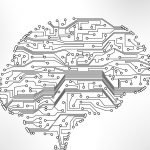Belly Fat Associated with Cognitive Function in Older Adults
Node Smith, ND
A recent study from Ireland has found that belly fat is associated with lower cognitive functioning in older adults (60 years and older).1 The study may have profound implications for a global dementia population that is predicted to increase 3-fold by 2040.
Previous Research notes that Overweight Individuals Underperform on Tests of Memory and Visuospatial Skills
Previous research has seen that overweight individuals underperform normal weight controls on tests of memory and visuospatial ability. That these findings hold true for older adults has not been as thoroughly studied, until now.
Concern not just for Ireland, but the industrialized world at large (pun intended)
This is concern not just for Ireland, but the industrialized world at large is experiencing the biggest increase in healthcare needs coming from a rapidly growing elderly population, as the baby boomer generation begins to enter into old age. Obesity is a central concern for this patient population. In Ireland, over 50 percent of those over 50 years of age are classified as obese, with only 16% of men and 26% of women reporting healthy weight. These trends are similar for the United States.
Research study looked at data from roughly 5,000 individuals
The research study looked at data from roughly 5,000 individuals as part of the Trinity Ulster Department of Agriculture (TUDA) aging cohort study. The study looked at how waist-to-hip ratio was connected to cognitive performance. Waist-to-hip ratio is a measurement which indicates visceral adiposity, or belly fat. It is generally known that this particular type of body fat is associated with increased metabolic risk, cardiovascular disease and inflammation.
Waist-to-hip ratio associated with decreased cognitive function
The waist-to-hip ratio was associated with decreased cognitive function. However, the BMI (body mass index) was seen as a protective measure of cognitive function. The explanation for this has to do with BMI being a cruder measurement of body fat, that doesn’t consider fat-free body mass (muscle), which in this case may be a protective element to cognitive health.
Source:
- Ntlholang O, Mccarroll K, Laird E, et al. The relationship between adiposity and cognitive function in a large community-dwelling population: data from the Trinity Ulster Department of Agriculture (TUDA) ageing cohort study. Br J Nutr. 2018;:1-11.
Image Copyright: <a href=’https://www.123rf.com/profile_9nong’>9nong / 123RF Stock Photo</a>
 Node Smith, ND, is a naturopathic physician in Portland, OR and associate editor for NDNR. He has been instrumental in maintaining a firm connection to the philosophy and heritage of naturopathic medicine among the next generation of docs. He helped found the first multi-generational experiential retreat, which brings elders, alumni, and students together for a weekend camp-out where naturopathic medicine and medical philosophy are experienced in nature. Four years ago he helped found the non-profit, Association for Naturopathic ReVitalization (ANR), for which he serves as the board chairman. ANR has a mission to inspire health practitioners to embody the naturopathic principles through experiential education. Node also has a firm belief that the next era of naturopathic medicine will see a resurgence of in-patient facilities which use fasting, earthing, hydrotherapy and homeopathy to bring people back from chronic diseases of modern living; he is involved in numerous conversations and projects to bring about this vision.
Node Smith, ND, is a naturopathic physician in Portland, OR and associate editor for NDNR. He has been instrumental in maintaining a firm connection to the philosophy and heritage of naturopathic medicine among the next generation of docs. He helped found the first multi-generational experiential retreat, which brings elders, alumni, and students together for a weekend camp-out where naturopathic medicine and medical philosophy are experienced in nature. Four years ago he helped found the non-profit, Association for Naturopathic ReVitalization (ANR), for which he serves as the board chairman. ANR has a mission to inspire health practitioners to embody the naturopathic principles through experiential education. Node also has a firm belief that the next era of naturopathic medicine will see a resurgence of in-patient facilities which use fasting, earthing, hydrotherapy and homeopathy to bring people back from chronic diseases of modern living; he is involved in numerous conversations and projects to bring about this vision.










